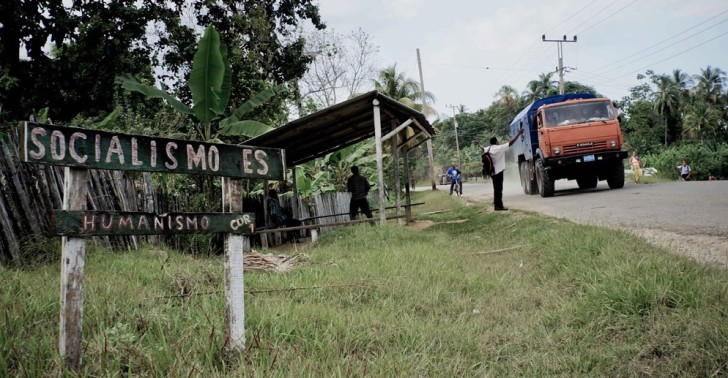
Our academic world: Intellectual onanism?
HAVANA — It is a common practice in developed societies to link the academic world to the formulation of policy by their governments. The participation of specialized thinking in the projection of policies becomes a normal activity for the purpose of feeding into a government’s decisions. To us in Cuba, this contributive liaison is indispensable.
We’re not a developed country in economic terms, but we do have a sufficiently qualified academic and professional class to assume a prominent role in the formulation of projects and probable answers that will be useful to the government’s actions. In this dimension, yes, we qualify as “developed.”
This need to contribute specialized knowledge (which didn’t happen suddenly today) becomes more evident, almost essential, when we see that, beginning on 17D [Dec. 17, 2014] and continuing with the steps taken by our government and the United States’, a new stage has begun, replete with possible benefits as well as risks.
We are obligated to assume such risks, not only on the basis of our leaders’ undeniable political experience but also with the serene contribution of our “think tanks.”
In the administrations of our northern neighbor, academic centers and their “think tanks” — not a gratuitous simile to the steel juggernaut on tracks — have participated and currently participate in parallel (and sometimes jointly) with government institutions in the making of political decisions.
17D did not happen at random. It came from diverse analyses that conjugated two realities: the delicate moment lived by our country in its economic, social and political spheres, and the geopolitical needs of the world’s greatest power.
There is no change in “method,” as the U.S. authorities have repeated, to face our reality by divine inspiration. 17D emerged from analytical thinking and the concepts of HOW the Americans could carry out their projects by integrating diplomatic relations, the use of social psychology applied to the various means of communication, the ways to move close to our society by profiling sectors, desires, lacks, expectations, etc.
They have studied everything. Whether they did so accurately or not is something else, and it’s closely related to HOW we assume the challenge, by integrating into unity the diversity of our current composition.
Cuba, our government and our society, cannot evade the new dynamics in relations, nor label with names drawn from a bag — as the Dadaists named their poems — the new economic actors. Nor can they ignore the evolutionary visions of the new generations — not necessarily contradictory with the socialist ideal, if we are respectful, intelligent and open to dialogue — which are today an overwhelming majority.
It becomes inevitable to act in the new and complex circumstances that coincide with our process of Actualization (reforms or changes that must continue), with methods that are appropriate for the 15th year of the 21st Century, methods very different from those of earlier eras, disqualified and overtaken by the new internal and international contexts.
It becomes urgent to take advantage of the wealth of thought, analyses, writings and researches done and currently undertaken by our think tanks and academic centers, which are rich in a serene and objective lucidity. It is a field where we enjoy the ability to build our HOW.
But, are we exploiting these resources?
In IPS-Cuba I read a very interesting report that collects the opinions of important Cuban socialist academicians committed to the process — and I worried. Some of their quotes appear below in italics.
Theoretical thought is undervalued in Cuba, a pending task for social science in the face of the imminent political, social and cultural effects of the reestablishment of relations with the United States, expressed historian, attorney and essayist Fernando Martínez.
For his part, politologist Esteban Morales cautioned that, while there can be no talk of a divorce, serious difficulties remain before we can achieve an adequate articulation between the social sciences and policy, something that’s “indispensable for the survival of the social project.”
“A nation can save its economy and simultaneously lose its revolution, because the revolutions of liberation have their capability in the cultural centers,” Martínez said.
Morales then reflected on the need for “a policy that takes advantage of all the intellectuals who write, so they may create texts that are more interesting, attractive and critical in our press, which we know is not good.”
He also lamented that the task given most frequently to Cuban social scientists has been to diagnose, not to predict, because “at times, when someone dared to foretell possible situations or phenomena, he ended up regretting it.”
When I read these statements and ponder them, and when I remember other statements made by friends or acquaintances in academia, I posit the initial subject from another angle, as an economist, if you will. I ask myself, “Why, then, did we train so many specialists in different fields of international politics, such as social or economic areas?”
Will that surprising number of centers dedicated precisely to such studies serve only for an act of intellectual onanism unable to generate results?
Our HOW goes through the fruitful marriage with academia as a participant in the formulation of policies and the dissemination of ideas and debates, so that we, the people, may participate actively and with knowledge of the full, integral reality of the different alternatives that our socialism can beget.
To close doors is an invitation to destroy the formulations, ideas and debates and we revolutionaries should not contribute to that. That might possibly be a recipe for the restoration of capitalism.

